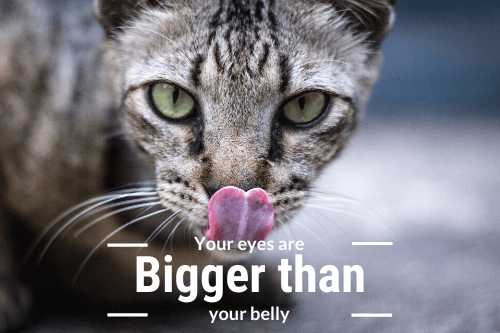
YouTube / iTunes / Spotify / Radio Public / Pocket Casts / Google Podcasts / Breaker / Overcast
Listen to ArtisanEnglish.jp posts & lesson intros here.
English Idiom: Eyes bigger than your belly
Food waste is a massive challenge in Western countries.
One of the leading causes of this waste is our eyes are bigger than our bellies.
For example, did you know that Japan wastes 3.3 million tons of food every year?
Most, if not all, of that food is imported from other countries because Japan is not food self-sufficient.
This expression, your eyes are bigger than your belly means to put so much food on your plate that you can’t eat it.
More simply, it means to be greedy.
That’s the reason for all this waste, folks – we are greedy.
I don’t want you to think I’m unfairly focusing on Japan, so let me tell you about Canada.
My home country wastes 2.2 million tons of food each year.
That’s 140 kg of food per household!
Once again, our eyes are bigger than our bellies.
Have you seen Canadian bellies recently?
Your average Canadian is obese, and many are grossly overweight.
Japanese are getting fatter, too.
People in both countries consume and waste too much.
Westerners are not only greedy when it comes to food.
We consume too much of everything.
Heck, even Marie Kondo, who published the book titled ‘The life-changing joy of tidying up,’ is now selling things for people to buy.
People’s eyes are still bigger than their bellies.
The amount of stuff they have cluttering up their houses has shrunk, but they are still greedy.
How about you?
Are your eyes bigger than your belly?
How much food do you waste?
I, myself, hate wasting food because it’s also losing money.
Let’s all put もったいない (mottainai) into practice, shall we?
Flesch-Kincaid Readability Test
This post is understandable by someone with at least a 7th-grade education (age 12).
On the Flesch-Kincaid reading-ease test, this post scores 73.
The higher the score on a scale of 0 – 100, the easier the passage is to read.

